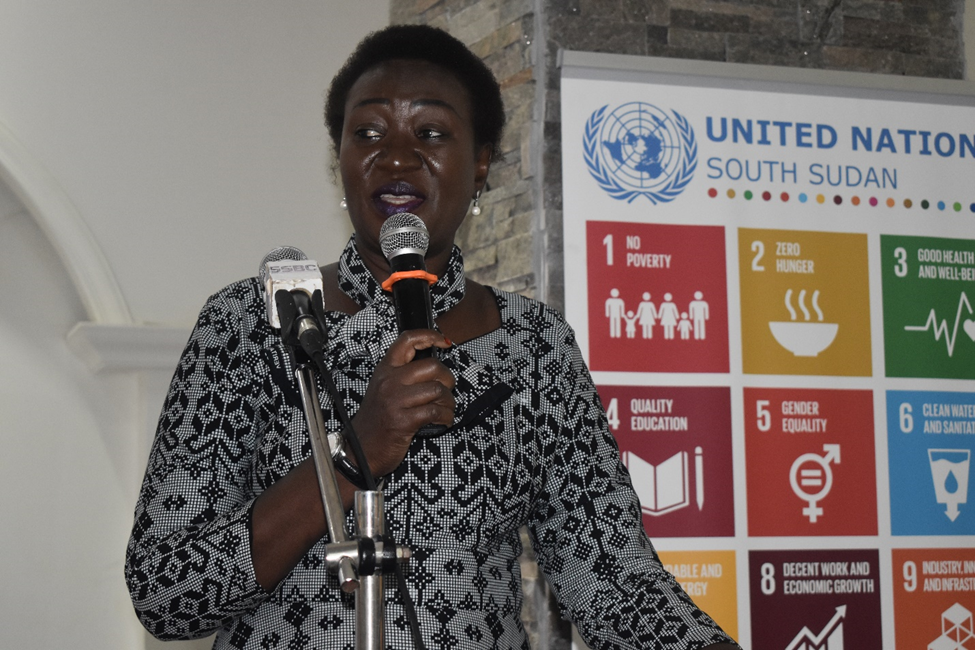
By Akol Madut Ngong
South Sudan government has promised to improve the salary scale of teachers at both primary and secondary education.
The minister of general education and instructions, Awut Deng Achuil made the pledge in Juba yesterday during the launch of national statement of commitments of the Republic of South Sudan, aimed at transforming education system in the country.
The national consultation on transforming education has brough together teachers, students and lecturers including some key players in education including United Nations representatives.
In her presentation, Minister Awut said, “we need to improve pay and condition for the teachers base on the resolution on general education annual review year conference of 2020, improve pay will improve moral teachers, motivation and make a teaching professional”.
The minister said that though South Sudan has made significant progress in education, it still faces a huge challenge.
“We must do what we can to overcome those challenges and achieve SDGs quorum, the right to education is defined in the transitional constitution in the Republic of South Sudan 2011, free education is not free than they children are deny to have right to education,” she said.
“We will not allow those who violate the constitution and the general education Act 2012 to go and unpunished, we must encourage and allow children, youth and adult to go to school and start learning including the estimated 2.8 million out of schools this is report from UNESCO of 2018,” she further stated.
The minister of general education however called on teachers and the learners to overcome COVID-19 factors and other challenges that hinder their participation and help in schools and realize the potential.
She said that the government should develop national instruction framework and train more than eight thousand school inspectors to inspects schools in the country.
In addition, she said they have completed the pilot and they have train headteachers and their deputies to improve the quality of school management and leadership.
“We must do our part to address global learning crisis, and enable our citizens to acquire the knowledge, skills attitudes and value necessary for work, life of sustainable development,” Minister Awut said.
“Our pastoralist community, this is the highlight that we have the pastoralist community education who constitute the vast majority about the population, girls and women, children and children with disability, internally displace persons, refugees and asylum seekers all must be given opportunity to become successful lifelong learner,” Awut added.
The minister said that the government have developed a new national curriculum printed and distributed over 2 million text books and teachers guard and trains more than 30 thousand teachers to deliver the new curriculum.
Moreover, the minister has advised student to utilize the programme as an opportunity to voice out all their grievances to be heard as they may not get any chance to speak on their own.
She called on the students who have attended the forum to speak on behave of all other learners of South Sudan.
“So, what you say it’s be must be realistic, it is something that can be done, not a statement, it is something that we can do as a country but not statement, we make the statement the remain in the best but we want to hear a voice that is bringing a solution to challenges, from the students, from teachers and from our lecturers,” she told learners.
“We policy makers, the members of parliament are here and I want them to take serious note from these students, when the teachers speak, let them hear properly because this are the people face the reality on the ground every single day. I want to encourage you to participate actively in the discussion, we are going to convene more consultation meeting to give a space to the stakeholders more opportunity to contribute and shape our national commitment,” Awut continued.
She said that the republic of South Sudan is quiet like every other member state of the UN to announce the commitment in the five genetic action tracks: inclusive equitable safe, healthy schools, learning and skills for life works, sustainable development, free teachers teaching and the teaching profession, digital learning and transformation, financing education.
Meanwhile, the representative of UN Resident and Humanitarian Coordinator in South Sudan, Sarah Nyatii stated that as United Nation, they have a lot of job to do to ensure that South Sudanese children of today are prepared to be leaders for tomorrow.
She said only 17.7% of teachers are women, and shockingly the male dominantly cultured. She added that the gender by education is extremely important, stating that child girls have special protection including sexual abusing. “We saw that 1.9 million children are in primary school, how is secondary school, why they dominate secondary school? Why they don’t complete? What about the girls? What are the factors that cause girls not to complete the secondary school? There are so many factors including water sanitation and hygiene, female latrine those are the things make mostly girls suffer in education then automatically she drop out,” she said.



